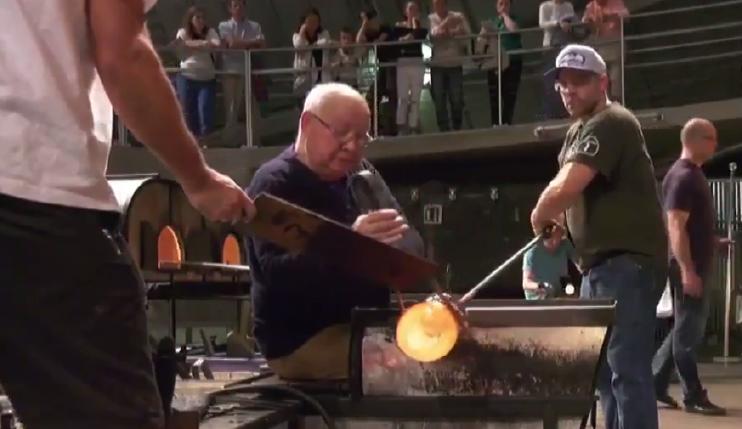DeLoggio Achievement Program
Preparation for and Selection of College and Professional Programs
Molding, Trimming, Succeeding
I’ve been reorganizing my life as well as my web page, allowing time for such frivolous exercises as watching world-famous glassblowers and potters, and I was reminded of something that might (should?) interest you. About a quarter of the glass gathered onto a blow pipe or the clay plopped onto the wheel comprises the finished piece. With each step, something is trimmed, shaped, thinned, evened out, until the scrap pile is heavier than the finished piece. (Heavier, but not bigger; there’s a lot of air in a bowl or vase.)
The same is true of the files in an admissions office. After the obvious rejects are tossed aside, the interesting and competitive files are reviewed, studied, added to, set aside, weeded out again, until about a fourth of the “good” applicants are offered seats.
Over the years I’ve had clients weeded out of schools because of a few too many typos, or a lack of command of the language (among both native speakers of English and folks whose daily language is another). In virtually every instance I’ve warned the client in advance and the client has failed to take my advice. So go watch a quick version of Lino Tagliapietra making a vase in four hours with a crew of 15, knowing it will sell for maybe $50k, and learn what “good enough” means.
Quora Copyrighted MaterialsAll the links below this box are owned jointly by Loretta DeLoggio and Quora. Be sure to follow the Copyright rules for both organizations when using this material. |
The Holy Grail
I'm constantly nagging people to learn to write. Some folks think I'm prejudiced against STEM students, international students, less-than-Ivy-League students. I'm not. I'm talking about good writers, and really good writers, and published writers. I'm talking about me.
In 1973 I took my first LSAT, and back then it had a graded writing sample. I got a 64, which was nearly a 90th percentile.
Not bad, considering I was a college sophomore. And I was already "published," if you count letters to the editor in the city's newspapers and Op-Ed pieces in the school paper. (Even I knew essays in my high school's literary journal didn't count.) I was proud of myself; I was a pretty good writer.
Then I graduated college and got a job. The first memo I wrote at my boss's direction was returned to me with just about everything but "Dear X" and my signature crossed out. (I feel compelled to point out that this was a STEM job, designing specified software "apps" for clients which we then ran on a mainframe computer, back in the 1970s.) I remember looking at it and saying "Irv, why didn't you just write it yourself?" and his answer was "You're the one who needs to learn."
And I guess I did, because a few years later I took the LSAT again and got a 98th or 99th percentile on the writing sample.
I went off to law school knowing I was a good writer, and proving it to everyone's satisfaction: best brief award in two different Moot Court competitions in two different years, one intramural and one National. I also published a piece in the New York State Bar Journal, at the insistence of my English Legal History instructor.
And I thought I was a pretty good writer.
Then I was planning to move from Philly to Durham, in about 1991, and I knew I'd have to force myself out of the house to learn my way around, so I signed up for two writing courses, one at Duke and one at Chapel Hill. I got abysmal critiques in both through the first half of the courses, until I learned how to describe vividly, how to remove unnecessary triple modifiers. I finished up with A's in both courses. And I thought I was a pretty good writer.
Sometime in the 1990s I fulfilled the dream of most verbal Americans; I wrote a novel. I was really proud of it (and still am). And I set it aside and went on with my work. Then, in around 2005, I had a client whose mom was an author's agent. At some point in the year that we worked together, I mentioned the novel and she asked to see it. After her critique, I was humiliated. But she at least gave me a ray of hope, saying "you have the seeds of a good writer, and if you want to work at it, you can get there." And for that I thanked her enormously. I knew I didn't want writing as a career; I wanted the one I had, helping people get into schools, bettering themselves. But I also knew I was only a pretty good writer.
At the same time, I rested on constantly freshened laurels; a compliment from Georgetown, Michigan, Texas, notes on my clients' acceptance letters, left me complacent with being a really pretty good writer.
Then I found, perhaps through an employee, an author named William Zinsser. He taught writing at Yale. I read his book "On Writing Well," and learned why I wasn't a great writer. I read his book "Writing to Learn," and got better again. And as I read here, and am awed by Robert Frost's writing (I may be his first non-STEM and non comic-book groupie), I think it's time to re-read Zinsser.
All the questions linked below this box are owned jointly by Loretta DeLoggio and Quora. Be sure to follow the Copyright rules for both organizations when using this material. |
How do I write a main idea in a sentence?
How do I write a more specific topic sentence?
Should I choose a topic from popular culture?
Writing
| Copyright | Take me to Home Page |
